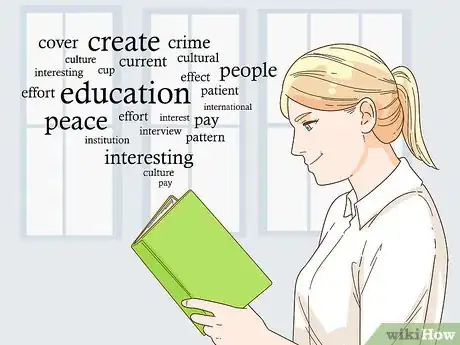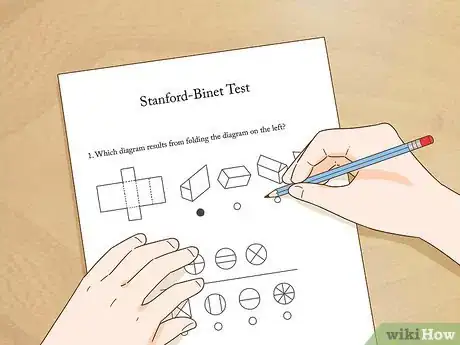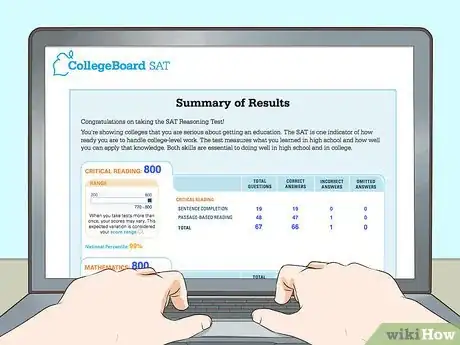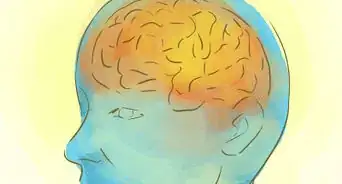This article was co-authored by Alicia Oglesby. Alicia Oglesby is a Professional School Counselor and the Director of School and College Counseling at Bishop McNamara High School outside of Washington DC. With over ten years of experience in counseling, Alicia specializes in academic advising, social-emotional skills, and career counseling. Alicia holds a BS in Psychology from Howard University and a Master’s in Clinical Counseling and Applied Psychology from Chestnut Hill College. She also studied Race and Mental Health at Virginia Tech. Alicia holds Professional School Counseling Certifications in both Washington DC and Pennsylvania. She has created a college counseling program in its entirety and developed five programs focused on application workshops, parent information workshops, essay writing collaborative, peer-reviewed application activities, and financial aid literacy events.
There are 17 references cited in this article, which can be found at the bottom of the page.
This article has been viewed 48,528 times.
Whether you were flagged as a gifted student at a young age, or you’re starting to discover your giftedness in adulthood, know that no 2 gifted individuals are the same. This is largely due to the fact that there are a few different domains of giftedness, including intellectual, academic, leadership, creative, and/or artistic giftedness.[1] IQ tests can provide one perspective on your intelligence. Generally, a gifted person is in the top 2% (or the 98th percentile) on IQ assessments and standardized tests. But these results don’t necessarily capture other aspects of giftedness, such as artistic abilities. Reflect upon your work habits, social interactions, emotions, and personality to spot signs of giftedness.
Steps
Assessing Your Learning Abilities
-
1Gauge how quickly you pick up new concepts and ideas. Do you find learning an easy (and perhaps fun) experience? A lot of gifted individuals turn to lectures, books, and documentaries from which they can soak up new facts and complex ideas.[2]
- Socially, gifted people like to engage in debates which nourish their minds with a barrage of challenging ideas and perspectives. If you love debates for this reason, to the extent that other people find you aggressive and intimidating, you could be gifted.
- In the workplace, you might be able to put new knowledge into practice very quickly. For instance, you might be proficient in a new software program within a few minutes, whereas it takes others a few hours and training sessions to competently navigate it.
-
2Ask yourself if you pursue knowledge and activities independently. While many people are content to stick with just 1 or 2 fields and hobbies, gifted people chase after a variety of experiences, ideas, and activities with a childlike sense of wonder. If you find yourself constantly drawn to different and seemingly unrelated things, this may signal your innate giftedness.[3]
- If you have this tendency, you might find it difficult to choose a major or stick to a career path.
- You may have faced some criticism for not focusing on just 1 thing.[4]
Advertisement -
3Reflect on the amount of knowledge you've amassed about 1 or 2 topics. Aside from a gifted individual’s preference for variety and diversity, it’s not uncommon to see self-directed learning on a single topic. Oftentimes, this focus and topic have little to do with other, more “practical” endeavors in an individual’s schooling and career.[5]
- If you exhibit an uncommon interest in figuring out exactly how trains work, or which developments came out of the Industrial Revolution – just for fun – you might be witnessing your gifted mind at work.
- Sometimes this focus can result in obsessive behaviors, like forgetting to eat when you’re in the middle of a project.
- But it can also result in highly productive and enjoyable work sessions while you’re in what psychologists call “flow” or “flow state.”[6]
-
4Consider whether you have a strong and highly active memory. Not everyone taps into their memory on a daily basis. But as a gifted individual, you might find yourself coming up with original analogies when trying to grasp new concepts and solve problems.[7]
- With a broad and deep knowledge base, gifted people can draw highly unusual connections and patterns across seemingly unrelated disciplines.
- These analogies might not make sense to those around you. This can put a damper on your exciting moment of discovery and understanding.
-
5Think about the size of your vocabulary. Many gifted people have minds like sponges. They enjoy encountering new words, processing and learning them, committing them to memory, and employing them in everyday life. If you find yourself delighted at learning a new phrase, discovering the etymology of a word, or using words that others don’t seem to understand, you’re similar to many other gifted individuals.[8]
- Your vocabulary has likely developed as a result of reading many different texts.
- If you’re not sure how large or advanced your vocabulary is, try one of the many online tests and quizzes to get a sense for how your vocabulary compares to the average person’s.
Examining Your Work Habits
-
1Pay attention to whether or not you’re a perfectionist. Many gifted individuals are perfectionists. If you’re a perfectionist, you set impossibly high standards for yourself (and often for others around you, too). You and others might joke around about your perfectionist habits, but it can be immensely frustrating when you and others fail to meet these expectations.[9]
- On the flip side, think about whether you feel frustrated when you do manage to reach your goals but fail to get a reward fitting for the intense amount of effort you dedicated to your work.
- Consider whether you’ve felt overwhelmed by your perfectionist tendencies in the past. These might be urges resulting from your giftedness that you can’t control.
-
2Think about whether you find group work to be tedious and frustrating. Group work can be especially challenging for gifted individuals since their minds seem to soar above those of their collaborators. Do you always end up doing the bulk of the work on a group project, picking up the slack of your less-gifted collaborators? Can you remember a time when you’ve seen the big picture but others failed to? If so, you exhibit one of the habits of a gifted individual.[10]
- If you and a team need to solve a problem, your zoomed-out perspective allows you to see all the factors and brainstorm a variety of possible solutions. But not everyone can see what you see.
- You might sense that your colleagues or classmates don’t understand your ideas, and as a result, they find your contributions confusing and annoying.
-
3Decide if you require complex challenges to stay engaged. As a gifted individual, you’re drawn to intriguing problems and love tackling complicated puzzles. Your mind craves new challenges and stimulation at work and at school. When you’re intellectually or creatively challenged on a regular basis, you thrive![11]
- If you don’t have a variety of projects to dig into, or if the projects you’re working on are too simple, you’ll start to disengage and lose interest in school and work.
- An easy way to spot giftedness is by noticing that you get bored and restless in the absences of suitable challenges.
- If you're in school, you may notice that you always finish your homework early or that the material in class seems boring because it isn't challenging enough.[12]
-
4Consider if you’re intentionally seeking work well below your abilities. This might seem contradictory, but many gifted people choose to pursue less ambitious careers. Look at your career history and think about how you’ve made job hunting decisions. If you’re avoiding the boredom and monotony of a corporate job, or you’re sticking with a low-level but highly engaging job, chances are you could be a gifted individual in disguise.
- Sometimes gifted employees prefer work that’s less creatively and intellectually exhausting. This frees them to use up their creativity and intellect on their own projects.[13]
- Related to perfectionism, many gifted individuals struggle to reach their near-impossible career goals. Abandoning these goals in favor of underemployment may come as a huge relief.
- This path might not necessarily be the most productive use of an individual’s gifts. It’s healthier to find a balance of realistic goals and expectations that aren’t too overwhelming to cope with.
Finding Clues in Social Behaviors
-
1Determine whether you’re an introvert or an extrovert. While there are plenty of outgoing, extroverted gifted people out there, it’s more common for gifted individuals to exhibit signs of introvertedness. This means they’re shy and reserved. Think about whether you tend to get overwhelmed by large gatherings of people, and if you prefer to sit alone with your thoughts.[14]
- As a gifted introvert, you may find socializing with others to be uncomfortable and overwhelming, especially if you’re not in the company of gifted or introverted peers.
- Many personality assessments, including the Myers-Briggs Type Indicator (MBTI), provide results on where you fall on the introvert/extrovert spectrum.[15] You can take the MBTI online for a fee. Speak with a school administrator or psychologist to set up an in-person test.
-
2Reflect on whether you often feel misunderstood or like an outsider. As a gifted individual, you’ll naturally have different interests, ideas, and abilities than your peers. It might feel like other people can’t relate to you, and that you’re alone in your giftedness. This can be alienating and upsetting.[16]
- Even though gifted individuals are usually highly competent, they often feel imposter syndrome when entering new environments.
- Know that you’re not alone! Instead, you’re just one of the many gifted individuals who feel the same way from time to time.
-
3Monitor how intensely you experience emotions and urges. Maybe you feel like the drive to fulfill your potential is driving you crazy. Perhaps you get overwhelmed by too many options, projects, and possibilities in your day-to-day life as well as far into the future. If so, you’re like other gifted individuals who experience greater intensity in their lives than the average person.[17]
- Gifted individuals tend to be deeply moved by natural beauty and the arts, exhibiting intense emotional responses that others might not understand.[18]
-
4Pay attention to how quickly you think and speak. When gifted people are trying to express themselves, they have a tendency to speak rapidly in an effort to keep up with how quickly their minds are working. If people tell you to slow down when you’re formulating thoughts into words, and if you feel like you can’t type as fast as your ideas are coming to mind, you may be gifted.[19]
- Socially, this behavior can get gifted individuals in trouble. Interruptions can come off as rude or annoying.
- For instance, they often can’t help but cut off another person mid-sentence, since their mind is already leaps and bounds ahead of what they’re hearing.
Taking IQ Tests
-
1Take the Stanford-Binet test to receive your IQ score. Contact a professional psychologist or a school counselor to schedule a test date. You can’t really prepare for this type of test, but you should show up having eaten, hydrated, and gotten a good night’s sleep. Complete the test under the supervision of the test administrator, and await the results via mail or email.[20]
- Your test result will be a number between 40 to 160. This number is your IQ, or intelligence quotient.
- If you score between 130 and 144, you’re considered gifted along with 2% of the population.
- If you achieve a score above 145, you’re part of the 0.1% of the population considered highly gifted.
-
2Complete the Wechsler Adult Intelligence Scale (WAIS) test for another IQ result. This 12-minute, 50-question test is formulated for adolescents and adults who want to know their IQ.[21] While it’s advisable to contact a psychologist or school counselor to schedule a moderated test, you can also complete the test online.[22]
- If your score is 130 or above, you’re considered gifted.
- For younger individuals, the Wechsler Intelligence Scale for Children may be more suitable.[23]
-
3Study your scores from achievement tests and standardized tests. Chances are you’ve taken a handful of standardized tests at school. You may have chosen to take additional tests (such as the SAT or ACT in the United States) as part of a college application process. Examine your test scores to see which percentile you fall within. If you consistently score within the 98th percentile, this means you performed better than 98% of other testers and are academically gifted.[24]
Expert Q&A
Did you know you can get expert answers for this article?
Unlock expert answers by supporting wikiHow
-
QuestionHow do I know if my child is gifted?
 Alicia OglesbyAlicia Oglesby is a Professional School Counselor and the Director of School and College Counseling at Bishop McNamara High School outside of Washington DC. With over ten years of experience in counseling, Alicia specializes in academic advising, social-emotional skills, and career counseling. Alicia holds a BS in Psychology from Howard University and a Master’s in Clinical Counseling and Applied Psychology from Chestnut Hill College. She also studied Race and Mental Health at Virginia Tech. Alicia holds Professional School Counseling Certifications in both Washington DC and Pennsylvania. She has created a college counseling program in its entirety and developed five programs focused on application workshops, parent information workshops, essay writing collaborative, peer-reviewed application activities, and financial aid literacy events.
Alicia OglesbyAlicia Oglesby is a Professional School Counselor and the Director of School and College Counseling at Bishop McNamara High School outside of Washington DC. With over ten years of experience in counseling, Alicia specializes in academic advising, social-emotional skills, and career counseling. Alicia holds a BS in Psychology from Howard University and a Master’s in Clinical Counseling and Applied Psychology from Chestnut Hill College. She also studied Race and Mental Health at Virginia Tech. Alicia holds Professional School Counseling Certifications in both Washington DC and Pennsylvania. She has created a college counseling program in its entirety and developed five programs focused on application workshops, parent information workshops, essay writing collaborative, peer-reviewed application activities, and financial aid literacy events.
Professional School Counselor
References
- ↑ https://www.nagc.org/domains-giftedness
- ↑ https://www.psychologytoday.com/us/blog/career-transitions/201508/how-does-your-giftedness-affect-your-career
- ↑ https://www.psychologytoday.com/us/blog/career-transitions/201508/how-does-your-giftedness-affect-your-career
- ↑ http://highability.org/67/you-may-be-gifted-get-over-it/
- ↑ https://www.psychologytoday.com/us/blog/gifted-kids/201105/is-your-child-gifted-what-look-why-you-should-know
- ↑ https://www.apa.org/monitor/dec05/gifted
- ↑ https://www.psychologytoday.com/us/blog/gifted-ed-guru/201112/the-double-edged-sword-giftedness-part-1-cognitive-traits
- ↑ https://www.psychologytoday.com/us/blog/gifted-ed-guru/201112/the-double-edged-sword-giftedness-part-1-cognitive-traits
- ↑ https://turnerpsychologycalgary.com/perfectionism-gifted-adults-have-high-standards/
- ↑ https://www.psychologytoday.com/us/blog/gifted-ed-guru/201112/the-double-edged-sword-giftedness-part-1-cognitive-traits
- ↑ https://www.psychologytoday.com/us/blog/career-transitions/201508/how-does-your-giftedness-affect-your-career
- ↑ Alicia Oglesby. Professional School Counselor. Expert Interview. 29 October 2020.
- ↑ https://www.psychologytoday.com/us/blog/career-transitions/201508/how-does-your-giftedness-affect-your-career
- ↑ https://www.psychologytoday.com/us/blog/career-transitions/201508/how-does-your-giftedness-affect-your-career
- ↑ https://www.myersbriggs.org/my-mbti-personality-type/mbti-basics/extraversion-or-introversion.htm?bhcp=1
- ↑ https://www.psychologytoday.com/us/blog/career-transitions/201508/how-does-your-giftedness-affect-your-career
- ↑ https://rainforestmind.wordpress.com/2018/05/01/recognizing-giftedness-in-adults/
- ↑ https://www.psychologytoday.com/us/blog/gifted-kids/201105/is-your-child-gifted-what-look-why-you-should-know
- ↑ https://www.psychologytoday.com/us/blog/gifted-kids/201105/is-your-child-gifted-what-look-why-you-should-know
- ↑ https://www.nagc.org/resources-publications/gifted-education-practices/identification/tests-assessments
- ↑ https://www.mentalhelp.net/articles/psychological-testing-wechsler-adult-intelligence-scale/
- ↑ https://wechsleriqtest.com/
- ↑ https://www.nagc.org/resources-publications/gifted-education-practices/identification/tests-assessments
- ↑ https://www.nagc.org/resources-publications/gifted-education-practices/identification/tests-assessments
- ↑ https://www.princetonreview.com/college-advice/good-sat-scores
- ↑ https://www.princetonreview.com/college-advice/good-act-scores
- ↑ https://www.manhattanreview.com/act-percentiles/
- ↑ https://www.psychologytoday.com/us/blog/gifted-kids/201112/gifted-kids-learning-problems











































































